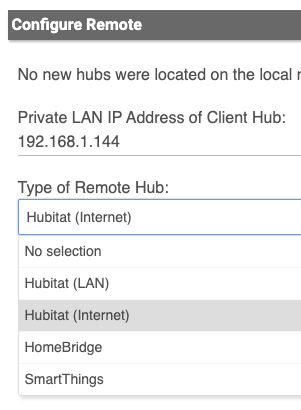False ![]()
HubConnect was built with this capability from the earliest days. Mostly because the Author goes Camping for months at a time and he has Internet in the Camper and ties it back to his primary Hub. There's a hundred plus devices in the camper... every door / window has a contact sensor so he can tell at a glance if the camper is road ready, as an example.
HubConnect offers an Internet option for connecting hubs:

The "internet" option is an outgrowth of the SmartThings integration.. The way into SmartThings is via their cloud. Well the same is true externally via Hubitat's cloud.

